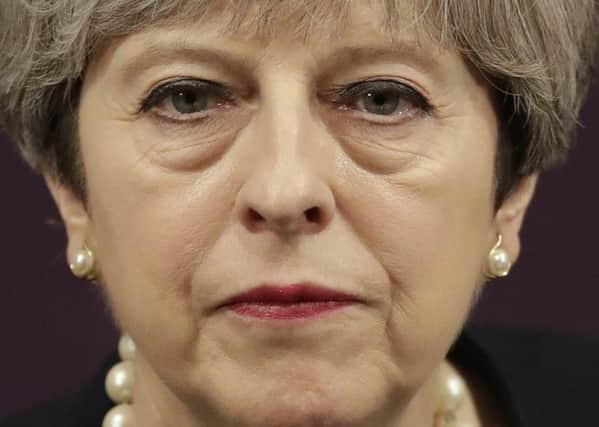YP Comment: A political mess of PM's making. Goodwill vanishes in an instant


Fast forward 12 months and the public mood has changed markedly; those prepared to give Mrs May the benefit of the doubt until her dreadful election miscalculation are no longer prepared to do so, and many want her to fail.
As the election showed, Britain has never been more divided, at a time when it needs to be pulling together to ensure that the UK leaves the European Union on the most favourable terms possible.
Advertisement
Hide AdAdvertisement
Hide AdAfter uniting the Tory party following her predecessor’s abrupt fall from grace, it’s up to Mrs May to show that she’s not only the best person for the job but that she can work with her political friends and foes alike in the national interest.
It won’t be easy – party politics has never been more febrile – but what Britain requires more than most is a period of stability until the terms of the country’s exit from the EU have been negotiated.
That said, domestic concerns remain paramount. Mrs May should not need reminding about the hardship suffered by front line public sector workers whose annual pay increase has been capped since 2010. Yet, despite the obvious strains in the nation’s finances, it would be remiss to overlook the private sector and the ‘just about managing’ families she courted a year ago – they, too, are weary of broken promises and empty rhetoric.
And then there’s Yorkshire. Mrs May only visited this county after she called an election. Now there’s little prospect of her returning here until the next election – or a new government is formed. It shouldn’t be like this. She prides herself as being a One Nation leader and should begin her second year by paying greater heed to the regions, rather than her barely competent advisors, if she wants the Government to hold together. For, if she had done so in the first place, she might not be facing such an unparalleled mess of her own making.
May’s Brexit blues
Advertisement
Hide AdAdvertisement
Hide AdTHERESA MAY and the Government’s perspective on Brexit is very different from the view held by many others. She will argue that she’s getting on with the job – Article 50 has been invoked, negotiations with the EU have started and the Great Repeal Bill will be published today.
However business leaders – the very people who know how to make money and create jobs – hold a contrary opinion. More than a year after the country voted to leave EU, they see a chaotic and confused government in which even the most ardent Brexit-supporting Ministers are flummoxed by the complexity of the challenge. After Boris Johnson, the Foreign Secretary, said the EU could “go whistle” over its financial demands, its chief negotiator Michel Barnier offered this retort: “I’m not hearing any whistling, just the clock ticking.”
Even though Brexit Secretary David Davis did, in fact, have a successful career in the private sector before becoming MP for Haltemprice and Howden 30 years ago, it’s surprising that not only is the Government unwilling to work with its political opponents, but it appears intent on excluding leading wealth-creators from the process. How remiss.
When individuals like Barclays chief executive Jes Staley warn that Britain must still be able to attract the brightest and best staff, or agricultural leaders say at the Great Yorkshire Show that the farmers require certainty more than anything else, Ministers should be utilising the expertise of those who genuinely want the best for their country. Not to do so would be just as reckless as Mrs May’s ill-fated decision to hold an unnecessary election in the first place.
Grenfell’s grief
Advertisement
Hide AdAdvertisement
Hide AdTHOUGH time is said to be the greatest healer of all, this adage is totally worthless when it comes to the Grenfell Tower tragedy. One month after at least 80 people were killed in the tower block inferno, neither the final death toll, or formal identity of the victims, will be known for many months because of the intensity of the flames.
Their grief was palpable at last night’s vigil. The lives of the survivors will, forever, be overshadowed by the tomb in the sky located at the place that they called home, a high-rise building that was a beacon of hope to its residents, and a symbol of multi-culturalism, before serial safety lapses were exposed with the most tragic of consequences.
Moving forward, only total transparency will now suffice if Grenfell’s grief is not to be in vain.